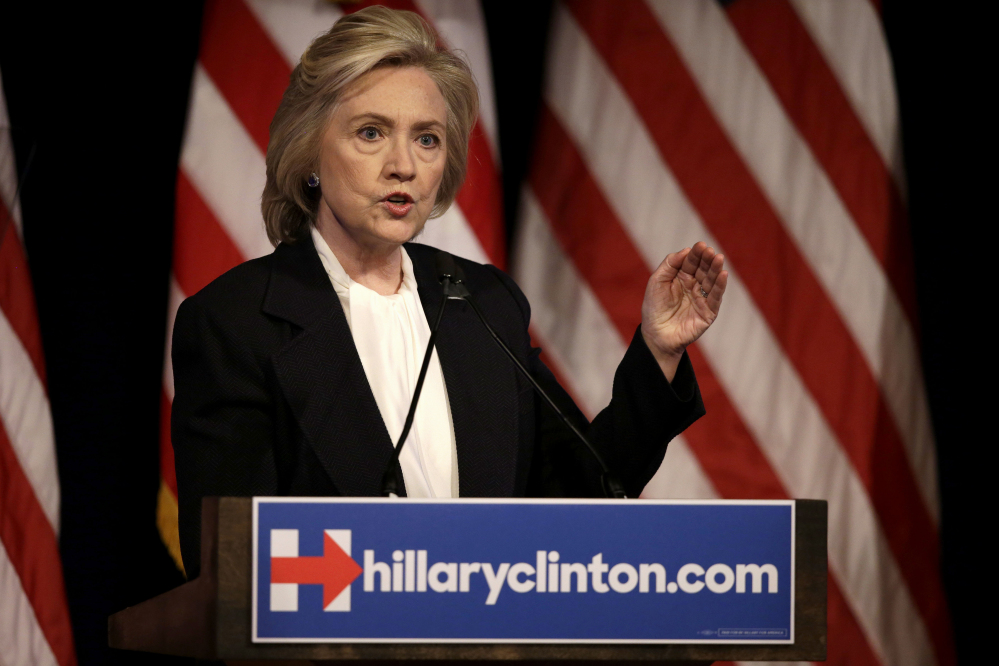NEW YORK – Laying out her agenda to help American workers, Hillary Rodham Clinton said Monday that if she is elected to the White House she will seek to build a “growth and fairness economy” that would rejuvenate wages that have remained stagnant since the Great Recession.
In the first major economic speech of her presidential campaign, Clinton vowed to crack down on Wall Street excess and warned that a large field of Republican White House hopefuls would promote tax cuts and a return to policies that would balloon the national debt. She singled out three Republican candidates, including former Florida Gov. Jeb Bush, whom she accused of failing to understand the plight of workers.
“You may have heard Governor Bush say last week that Americans just need to work longer hours. Well, he must not have met very many American workers,” Clinton said at The New School in New York, urging Bush to speak to nurses, truckers or fast food workers. “They don’t need a lecture. They need a raise.”
Bush, during an event in Sioux City, Iowa, said Clinton believed that it didn’t matter that 6.5 million people were only able to work part-time instead of holding full-time jobs. “Hillary Clinton believes that 2 percent growth, apparently the new normal, is acceptable,” Bush said.
He told reporters that Clinton’s “policies are going to suppress wage growth. Her policies are a continuation of the Obama economics which has been a complete disaster.” Republicans note that under President Barack Obama, the workplace participation rate has declined to its lowest level since 1977.
In an agenda-setting address, Clinton sought to appeal to liberal voters within her party who have questioned her willingness to regulate Wall Street and have rallied behind her chief Democratic rival, Vermont Sen. Bernie Sanders. The message also appeared aimed at anxious voters who have seen little gains in their paychecks even as the nation moves past the Great Recession.
“As the shadow of crisis recedes and longer-term challenges come into focus, I believe we have to build a growth and fairness economy,” Clinton said. “You can’t have one without the other.”
Clinton said she would propose more public investment in infrastructure projects, advance renewable energy and promote tax cuts for small business owners. She expressed support for an increase in the federal minimum wage, an overhaul to the tax code, and policy proposals related to child care and paid family leave.
Clinton, who maintained strong ties to Wall Street as a New York senator, pushed back against the industry, saying the largest financial institutions had too often focused on short-term profits instead of helping grow the economy.
She expressed outrage at accounts of money laundering and currency manipulation involving several major financial firms, calling them “shocking,” and promised criminal prosecutions of bad bankers. One of the firms she identified, HSBC, paid former President Bill Clinton $200,000 to speak at a Florida conference in 2011, an appearance that was cleared by the State Department despite an ongoing federal money-laundering probe that led HSBC to reach a 2012 settlement with prosecutors.
The former secretary of state said few rogue traders had faced consequences for malfeasance, a subtle swipe at the Obama administration, which took no action against the individual financial titans who pursued risky fiscal practices. “This is wrong, and on my watch it will change,” she said.
Clinton also vowed to expand the Dodd-Frank law passed by Congress in 2010, which tightened regulation of financial institutions, and said she would bolster government oversight of hedge funds and high-frequency traders.
The speech offered Clinton’s most extensive critique of Bush, a top contender for the GOP nomination.
Clinton said the nation’s economy should not be measured by “some arbitrary growth targets untethered to people’s lives and livelihoods.” That was a veiled reference to Bush, who has said he would set a goal of 4 percent economic growth, including 19 million jobs, if elected president.
She also lobbed criticism at Florida Sen. Marco Rubio and Wisconsin Gov. Scott Walker, who was launching his campaign Monday. Rubio’s tax proposal is a “budget-busting giveaway to the super-wealthy,” Clinton said, and she called Walker an example of a GOP governor who had made his name “stomping on workers’ rights.”
Rubio spokesman Alex Conant said Clinton wanted to “take us back to yesterday, but we cannot raise taxes like the 1990s or increase spending like the 2000s. Marco is proposing a 21st century tax plan that would benefit all Americans, especially middle-class families.”
Clinton, meanwhile, made no mention of Sanders, who has wooed Democrats by making economic inequality the central plank of his insurgent campaign.
Copy the Story LinkSend questions/comments to the editors.



Success. Please wait for the page to reload. If the page does not reload within 5 seconds, please refresh the page.
Enter your email and password to access comments.
Hi, to comment on stories you must . This profile is in addition to your subscription and website login.
Already have a commenting profile? .
Invalid username/password.
Please check your email to confirm and complete your registration.
Only subscribers are eligible to post comments. Please subscribe or login first for digital access. Here’s why.
Use the form below to reset your password. When you've submitted your account email, we will send an email with a reset code.